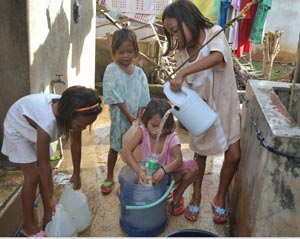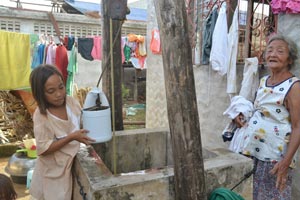Meet the Mondejar sisters: Nelia, Sarah Jane and Rizza Mae. They are aged 10, 8 and 5 respectively and they have been tasked with fetching water 10 times a day from a well and taking it to the high school where they are currently living in one of the classrooms. The water is dirty and contaminated with salt, but they have no choice but to drink it and now fuel is running low they can’t even boil the water before drinking it.
 Meet the Mondejar sisters (from right): Nelia, Sarah Jane and Rizza Mae. They are aged 10, 8 and 5 respectively. Next to them is their friend, Jennylyn Pepito, 6 years old. They are all housed in one of the classrooms of Daanbantayan National High School which currently serves an evacuation center for 160 families.
Meet the Mondejar sisters (from right): Nelia, Sarah Jane and Rizza Mae. They are aged 10, 8 and 5 respectively. Next to them is their friend, Jennylyn Pepito, 6 years old. They are all housed in one of the classrooms of Daanbantayan National High School which currently serves an evacuation center for 160 families.
The Oxfam assessment team chanced upon them while they were crossing the street on their way back to the evacuation center. They were carrying a gallon of water each. Rizza Mae, who is only 5, lags behind, barely keeping up with her elder sisters. It turns out, they are the ones assigned to fetch water for their Mom’s who were also in-charged with cooking their food.
I followed them as they made their way back after emptying their gallons in a pail outside their room. They crossed the street again, wove their way among houses to get to a well in one of the houses further back. There I met, Nanay Teofila Melendez, 82 who owns the well. She told me that from 2 PM till late in the evening, and even early dawn, the people from the evacuation center would find their way there to fetch water. She told me they only used it for washing given that it’s mixed with salt water. However, with no electricity these days to run their water pipes, they are left with no choice but to also use it for drinking. Nanay Teofila said they boil the water prior to using it for consumption.
 While I chatted with Nanay Teofila, I see the kids happily getting on with the task. Nelia, being the oldest and the tallest, takes on the job of drawing water from the well. She then fills each gallon. When all 4 are filled, each girl would pick up one and then begin their exodus again.
While I chatted with Nanay Teofila, I see the kids happily getting on with the task. Nelia, being the oldest and the tallest, takes on the job of drawing water from the well. She then fills each gallon. When all 4 are filled, each girl would pick up one and then begin their exodus again.
I asked the girls how often they would fetch water in a day and they all replied, “Napu!” which means ten times in Cebuano. They said they fetch water in the morning, during lunch and then in the afternoon as well. When I asked them whether, like Nanay Teofila, they also boil the water for drinking, their mother and other women in the center replied they don’t bother anymore. They said they only have enough fuel for cooking food and when they get thirsty, they just drink the water as is. When I pointed out that it’s part salty, they all replied they hardly have any choice, given their situation.



